Term Page
Removal Defense
Many noncitizen defendants are already deportable (“removable”). This includes all undocumented people, as well as lawful permanent residents (green card-holders) who have become deportable because of a conviction. If immigration authorities find these people – which is likely to happen – they will be deported unless they are granted some kind of immigration relief. For these defendants, staying eligible to apply for immigration relief is their most important immigration goal, and may be their highest priority in the criminal defense.
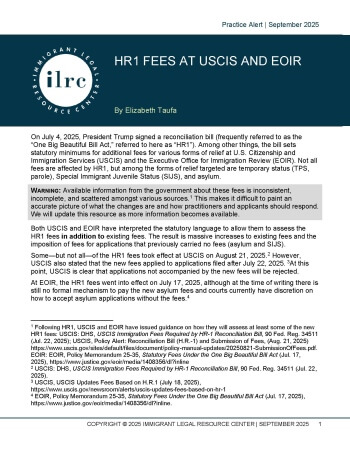
This practice advisory provides information about recently implemented fee increases at USCIS and EOIR. These fee increases are a result of the “One Big Beautiful Bill Act” also known as HR1. This advisory explores what we know and what we still don’t know about the fees, how to pay them, and potential future changes.
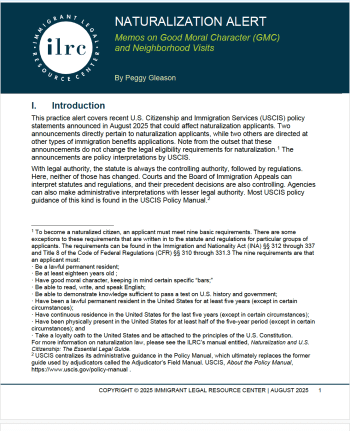
This practice alert covers recent U.S. Citizenship and Immigration Services (USCIS) policy statements announced in August 2025 that could affect naturalization applicants.
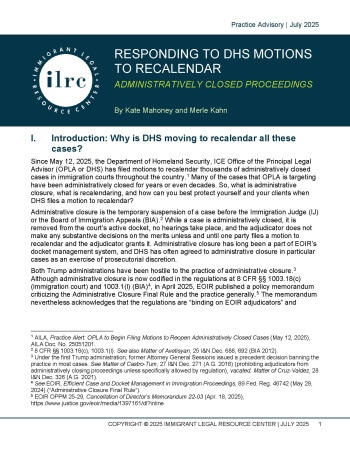
In recent months, the Department of Homeland Security has begun filing thousands of motions to recalendar administratively closed proceedings. This trend is raising questions about how attorneys and accredited representatives can respond to these motions and protect their clients’ interests, particularly in cases that have been administratively closed for many years. This advisory explores those questions and offers strategy considerations when determining how to proceed in each case.
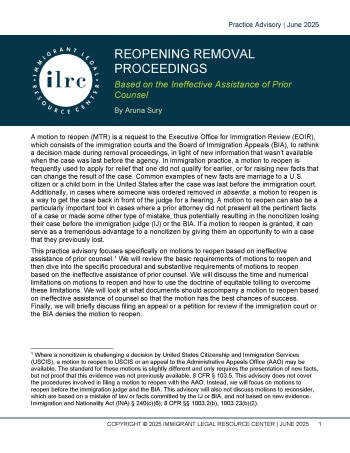
This practice advisory focuses on motions to reopen based on ineffective assistance of prior counsel. It reviews the basic requirements of motions to reopen and then dives into the specific procedural and substantive requirements of motions to reopen based on the ineffective assistance of prior counsel. It discusses the time and numerical limitations on motions to reopen and how to use the doctrine of equitable tolling to overcome these limitations. It also covers what documents should accompany a motion to reopen based on ineffective assistance of counsel so that the motion has the best chances of success. Finally, it briefly discusses the option of filing an appeal if the immigration court or the BIA denies the motion to reopen.
This advisory discusses the immigration consequences of a conviction for a controlled substance offense under California Prop 36, specifically Cal. H&S Code § 11395. This advisory explains the immigration consequences of a criminal plea to a Prop 36 controlled substance offense. It outlines criminal defense strategies for defenders to avoid these pleas and outlines removal defense strategies for immigration practitioners where the plea cannot be avoided.
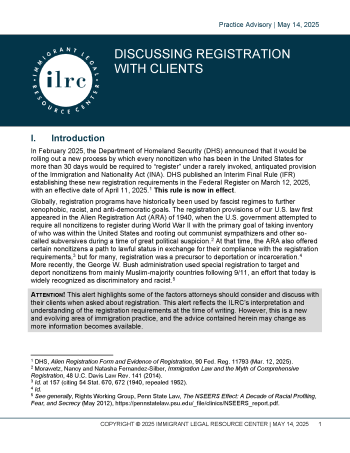
On April 11, 2025, the new Form G-325R took effect as a general tool to register all previously unregistered noncitizens under an antiquated and rarely invoked provision of the Immigration & Nationality Act, with criminal penalties for willful failure to register. This advisory was written to assist attorneys in discussing registration and the new Form G-325R with clients, including screening for prior registration and assessing the potential consequences of registering or not registering, so that individuals can make informed decisions about how to proceed in light of this new rule.
The Trafficking Victims Protection Reauthorization Act of 2008 confers initial jurisdiction over asylum claims filed by unaccompanied children (UCs) to the asylum office. The Board of Immigration Appeals’ decision in Matter of M-A-C-O-, along with policy changes implemented during the first Trump administration, sought to strip away this crucial protection from many child asylum seekers. Because of these changes and legal challenges by immigrant youth advocates, the current landscape of initial UC asylum jurisdiction has changed. This practice advisory provides an overview of the current state of UC asylum jurisdiction following the Matter of M-A-C-O- decision and the outcome of the JOP v. DHS litigation. It also offers some arguments and practical tips to help practitioners advocate for their UC clients to receive the statutory protections afforded by the TVPRA, as well as the benefits from the JOP v. DHS litigation.
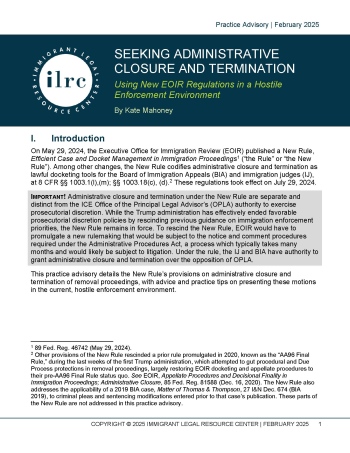
New EOIR regulations published in 2024 now allow immigration judges and the BIA to administratively close or terminate removal proceedings in a variety of scenarios. These regulations permit—and sometimes require—administrative closure or termination even where the Department of Homeland Security does not agree. In the current hostile enforcement environment, and in light of the rescission of formal guidance regarding prosecutorial discretion, these regulations are an important tool for advocates seeking to get clients out of removal proceedings.